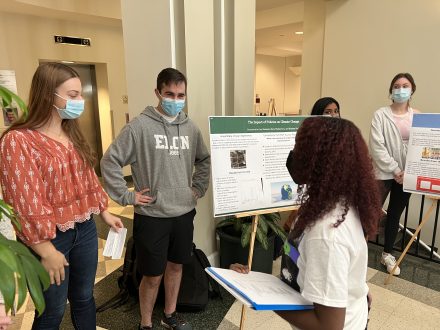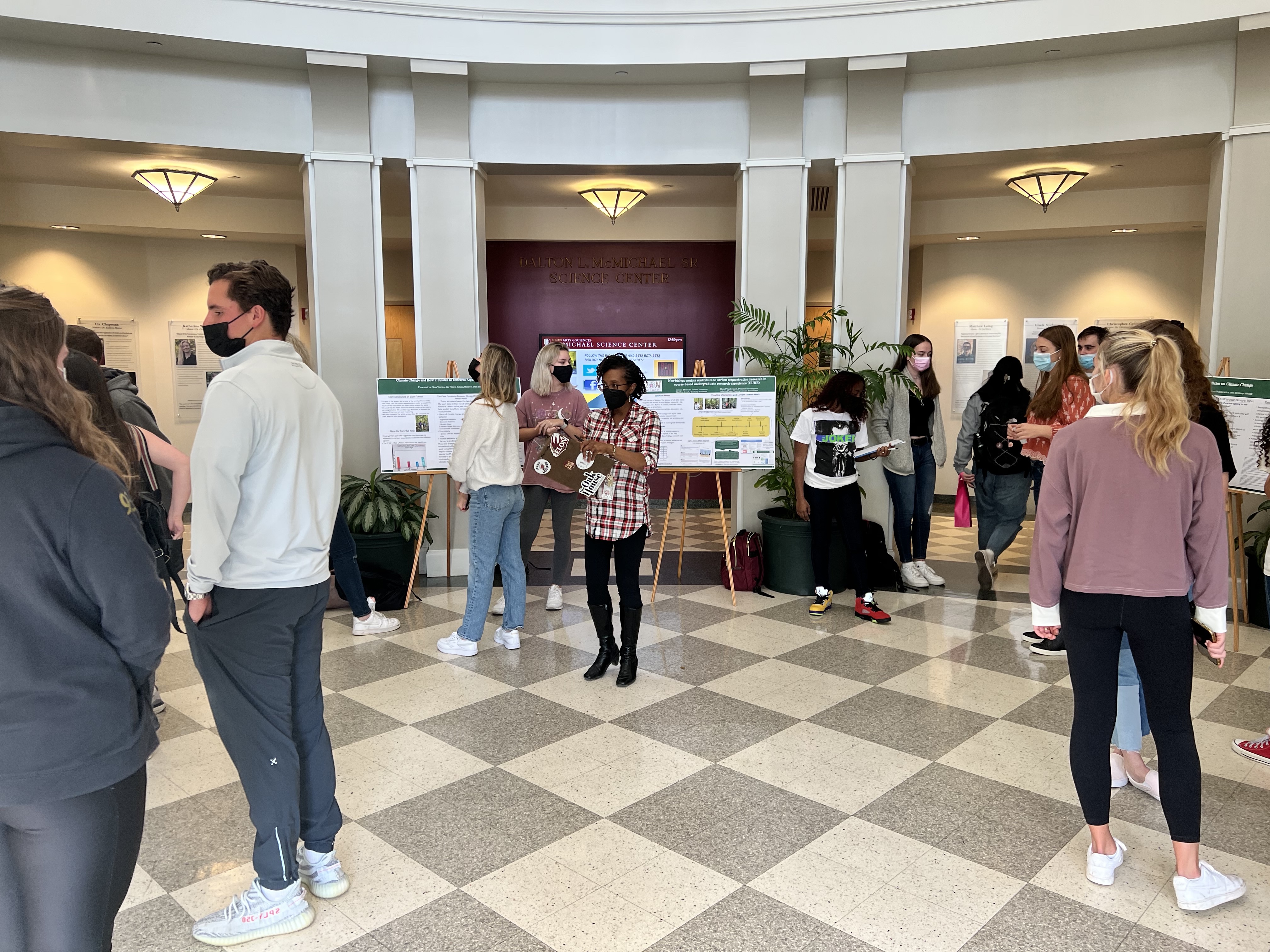Biology 1064: The Science of Life course, taught by Assistant Professor of Biology Jessica Merricks, worked closely with David Vandermast, associate professor of biology, and Ashlyn Crain '22 for their Lumen Prize research regarding carbon sequestering in trees.
Among the goals in the Boldly Elon strategic plan is to increase undergraduate research throughout the university, including providing new pathways to research for students. More and more students are finding that pathway through CUREs — course-based undergraduate research experiences — including those in a Department of Biology course designed for non-majors who were able to make unquestionable contributions to a Lumen Prize research project this fall.
“The idea behind CURE has been circulating in our department for a couple of years now,“ said Jessica Merricks, assistant professor of biology and instructor of the Biology 1064 course. “And it’s one of those things where there’s a lot of work that has to be put in to get it going.”
Students in the BIO 1064: The Science of Life course presented their findings from their work throughout the fall 2021 semester on Dec. 2 in the atrium of McMichael Science Center.
Merrricks was part of a committee last spring that focused on how to incorporate more engaged learning at Elon and worked to develop a blueprint of what course-embedded research should look like.
 Among the goals set out in the Boldly Elon plan are to achieve “100 percent participation in course-embedded undergraduate research, engage one-third of undergraduates in one-on-one, deeply mentored undergraduate research” and developing “curricula, short courses and certificate programs across … all colleges and schools.” Merricks’ course is a prime example of how Elon is working toward achieving those goals.
Among the goals set out in the Boldly Elon plan are to achieve “100 percent participation in course-embedded undergraduate research, engage one-third of undergraduates in one-on-one, deeply mentored undergraduate research” and developing “curricula, short courses and certificate programs across … all colleges and schools.” Merricks’ course is a prime example of how Elon is working toward achieving those goals.
“Between what I’ve already known and practiced with CUREs and the experience with the committee, it helped springboard the project,” Merricks said.
This semester, the 22 students in her BIO 1064 course worked with Lumen Prize recipient Ashlyn Crain ’22 and her mentor, Associate Professor of biology David Vandermast, to assist in their research regarding carbon sequestration in trees.
Crain’s research calculates the carbon budgets of four carbon dioxide-reducing strategies: urban forestry projects, afforestation (the planting of trees in non-urban areas), natural regrowth and preserving mature forests. The first three strategies will assess the break-even point, which is the number of years it takes for trees to reduce carbon beyond the carbon cost of planting them.
The last strategy of preserving mature forests will calculate the carbon sequestered in mature forests, thus estimating how long trees planted in the first three strategies would take to reach an equal level of removal.
After speaking with several faculty about the CURE opportunity, Vandermast connected with Merricks and said that the research would provide a good way for students to get outside of the usual lab setting.
“The Elon Forest project was a really good fit and I just so happened to get lucky that Ashlyn Crain … also has a serious interest in science education. She played a huge role in the development of the educational content that we put into the course,” Merricks said. “It’s been a collaboration between the three of us.”
The task of taking on scientific research can be daunting for even the most experienced of professions, let alone undergraduate students who aren’t looking to become biologists. But with the right guidance and framing, they were able to succeed and gain insight while having fun along the journey.
“When you’re told at first that you’re collecting raw data, I had an ‘Oh, no’ moment,” said strategic communications major Moira O’Neill ’24. “Through the process, though, I learned how simple the process can be with the correct tools. Dr. Merricks is such an incredible mentor to have as our teacher to help us pursue that.”
 Heeba Chergui ’22, an international and global studies major, said the class has opened her eyes to how important forestry is to everyday life.
Heeba Chergui ’22, an international and global studies major, said the class has opened her eyes to how important forestry is to everyday life.
“It was interesting to see how the data we collected relates to everything. The environment impacts everything. I was able to make some connections from our data and climate change towards my major,” she said.
Merricks said the work of the students in the course not only contributes to the body of knowledge about carbon storage in natural North Carolina forests but also serves as a testament to the work that non-expert citizens can do to contribute to the progress of scientific discovery.
The significance of this project, Merricks said, is those with little to no scientific expertise can contribute and in turn it makes science more accessible for all.
“This group of students has now had an opportunity to engage in real research that is going to be published and contributed to the scientific community, and they have a chance to actually communicate the importance of doing this type of work to a broader audience,” Merricks said. “We need to do more of this type of thing. I’m glad to see that Elon is incorporating engaged learning experiences as part of their strategic plan. We’re going to continue this kind of course.”



